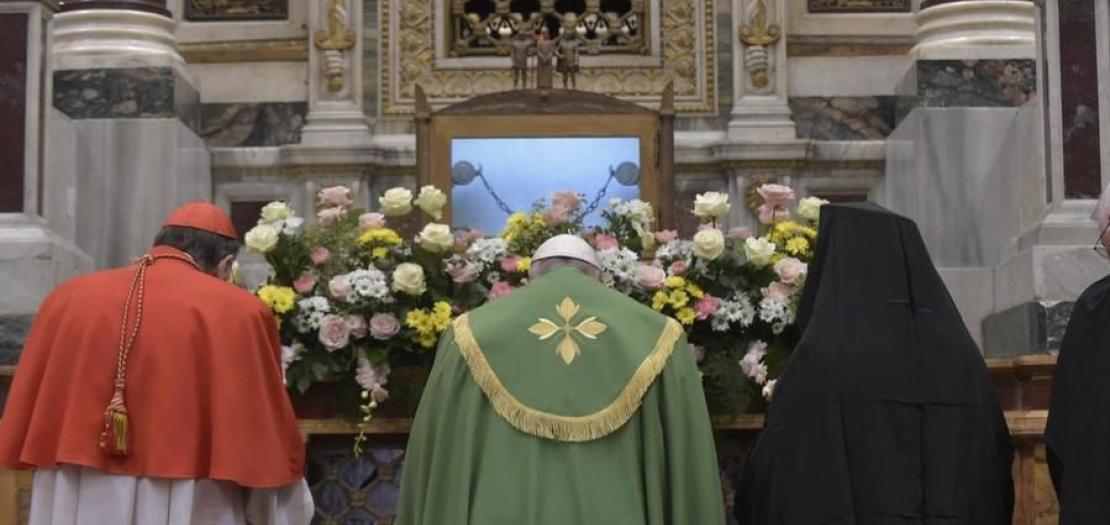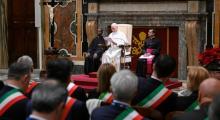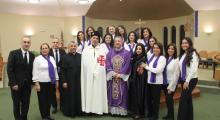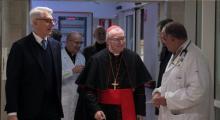Issued by the Catholic Center for Studies and Media - Jordan. Editor-in-chief Fr. Rif'at Bader - موقع أبونا abouna.org

During the week of prayer for Christian unity Tertullian’s phrase «see - they say - how they love each other» (Apologeticum 39,7) often comes to mind with nostalgia. The newness of the love brought by Jesus Christ, which filled pagans with admiration for Christians, was evident in a world where hatred prevailed. Then that union in charity was broken by the sin of divisions. The apologies have become treated to “be right” against other Christians considered enemies: “altar against altar”, from brothers in Christ to heretics to condemn and drive away. The world looking at Christians can say: “See the desolation of division and how fragmented they are! They do not love each other!”. From testimony to counter-testimony.
At the beginning of the 20th century, the first real steps of ecumenical dialogue were taken in the Protestant sphere. It was not easy because immediately two souls were highlighted: the one that wanted to affect the practical aspect, the action, convinced that “the action unites, the doctrine divides”; and that of those who sought unity through the effort to reach common theological statements. The Catholic Church remained in the background, with many personal efforts of theologians and monastic communities, but without official endorsement. The desire for union was accepted by the fathers of the Second Vatican Council; in the prologue to the decree on ecumenism Unitatis redintegratio (1965) they wrote: “The restoration of unity among all Christians is one of the principal concerns of the Second Vatican Council. Christ the Lord founded one Church and one Church only”. Since then the “separated” brothers are considered with respect and love; and this was deepened by Pope Francis when he says: “we can learn so much from one another! It is not just about being better informed about others, but rather about reaping what the Spirit has sown in them, which is also meant to be a gift for us” (Evangelii Gaudium 246).
The Catholic Church has brought as a gift the ability to maintain together action and doctrine: in the wake of the Council the pope reiterates that “If we concentrate on the convictions we share, and if we keep in mind the principle of the hierarchy of truths, we will be able to progress decidedly towards common expressions of proclamation, service and witness” (EG 246). The other brothers in Christ give us the opportunity to learn much about collegiality and synodality, the role of the laity and in particular of women. “Through an exchange of gifts, the Spirit can lead us ever more fully into truth and goodness” (EG 246).
For a long time ecumenism had been a discourse that remained intra-ecclesial, an inter-confessional dialogue. The real novelty today consists in rediscovering the eschatological dimension of unity, which concerns all of humanity, its salvation and all of creation. Christ the Saviour offers salvation to all people of all times. We pass from an ecclesiological perspective to a christological one. An ecumenism not based on the comparison of the churches, but on the rediscovery of the common mission, in which the Church is not for herself, but for the world, for real humanity especially the suffering, persecuted and discarded. In Christ, “brothers all”.
Thanks to ecumenical dialogue and the search for Christian unity, a new humanity can be born. “There can be no ecumenism worthy of the name without a change of heart. For it is from renewal of the inner life of our minds, from self-denial and an unstinted love that desires of unity take their rise and develop in a mature way” (UR 7). These words of the Council today resonate more clearly within us also thanks to the experience of the pandemic that has highlighted so much poverty in human relations. When we engage in dialogue at all levels, from large Synods to condominium meetings, we realize that most of the problems arise from the human limitations of our behavior: cultural and racial prejudices, repeated and sterile criticism, self-referentiality, narcissism, inability to listen, lack of patience and kindness, lack of good manners, hardness of heart, etc. We are increasingly convinced that unity is generated in small things, from small communities and expands to the Church and to the world. Pope Francis insists so much on the importance of small gestures that generate processes of unity: “loving actions change history: even the ones that are small, hidden, everyday. For God guides history through the humble courage of those who pray, love and forgive” (Angelus December 26th 2020).







